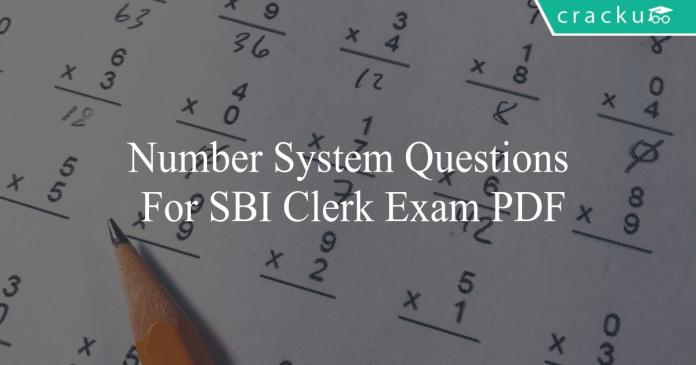Number System Questions For SBI Clerk Exam PDF
Download SBI Clerk Number System Questions & Answers PDF for SBI Clerk Prelims and Mains exam. Very Important SBI Clerk Number System questions on with solutions.
Download Number System Questions For SBI Clerk Exam PDF
20 SBI Clerk mocks for Rs. 149. Enroll here
Take a free mock test for SBI Clerk
Download SBI Clerk previous papers PDF
Question 1: The ratio of 3rd and 6th term of a GP is 27. If the first term of the GP is 10, then find out the sum of infinite terms of this convergent GP.
a) 30
b) 40
c) 15
d) 20
e) 25
Question 2: Sum of the first 3 terms of an AP is 2/9 times the sum of first 6 terms of the same AP. Find out the ratio of first term to the common difference of the same AP.
a) 3 : 8
b) 1 : 4
c) 2 : 7
d) 1 : 3
e) 1 : 5
Question 3: N is a number that leaves the same remainder on dividing 2527, 2419, 2383, and 2599. The largest value of N that satisfies the condition is
a) 54
b) 18
c) 72
d) 36
e) 90
Question 4: N is the smallest four digit number which leaves remainder 2, 3 and 4 when it is divided by 5, 6 and 7 respectively. Find the sum of the digits of the number ‘N’.
a) 12
b) 22
c) 17
d) 14
e) 19
Download SBI Clerk Previous Papers PDF
Take a free mock test for SBI Clerk
Question 5: N is the largest four digit number which leaves remainder 3, 4 and 5 when it is divided by 6, 7 and 8 respectively. Find the sum of the digits of the number ‘N’.
a) 32
b) 31
c) 34
d) 28
e) 27
Question 6: Second term of an AP is twice the fifth term. What is the sum of the first 15 terms of that AP?
a) -12
b) 7
c) 11
d) 0
e) -3
Question 7: The largest 4 digit number that leaves the same remainder when divided by 2, 3, 4 and 5 is
a) 9960
b) 9999
c) 9997
d) 9974
e) 9961
Question 8: A number leaves the same remainder on dividing 1120, 1248, 992, and 1184. The largest number that satisfies this condition is
a) 32
b) 64
c) 128
d) 256
e) 16
Question 9: Ramesh starts saving 3 rupees from 1st March and adds 4 rupees to the amount he saved the previous day. He saved till April 30th and stopped after that.What is the amount with Ramesh on May 1?
a) 7602 rupees
b) 7503 rupees
c) 7413 rupees
d) 7300 rupees
e) 7366 rupees
Banking Study Material – 18000 Questions
Question 10: In an Arithmetic Progression the sum of 4th and 5th term is 27. Twice the 3rd term is equal to the 6th term. What is the 18th term of the series?
a) 54
b) 60
c) 63
d) 57
e) 51
Question 11: A 2 digit number is such that the number is equal to 7 times the sum of its digits. The smallest such number is
a) 64
b) 42
c) 21
d) 12
e) 24
Question 12: A number leaves the same reminder on dividing 237 and 269. How many numbers satisfy this criterion?
a) 2
b) 5
c) 6
d) 8
e) 16
Question 13: Two natural numbers add up to 100. If it is known that both the numbers are even, how many pair of numbers satisfy this condition?
a) 49
b) 50
c) 24
d) 25
e) 99
Question 14: If the product of two prime numbers is 713, then find out the L.C.M. of these two numbers.
a) 713
b) 31
c) 23
d) 17
e) None of the above
Question 15: The product of two natural numbers is 9222. If they differ by 19 then find out the sum of the numbers.
a) 205
b) 199
c) 197
d) 195
e) 193
Question 16: The product of two natural numbers is 4810. If they differ by 9 then find out the sum of the numbers.
a) 149
b) 139
c) 135
d) 145
e) 147
Question 17: Number obtained by interchanging the digits of a two digit number is 18 more than the original number. If the sum of the digits of the number is 12, then find out what is the original number?
a) 39
b) 48
c) 57
d) 93
e) None of the above
Question 18: A man wins a lottery of 5000 Rs. He starts spending it starting with 30rs on day 1 and keeps on increasing the money he spends by 10rs every day. On which day will all of his lottery money get exhausted?
a) 38
b) 28
c) 33
d) 25
e) 30
Question 19: Mohan starts saving Rs 3,6,9,……… on each day starting from March 1st. He aims to buy a bicycle for himself costing Rs 10000. If his birthday is on 15th May, how much money will he have to take from his dad if he wishes to buy the bicycle on the day of his birthday itself?. (Assume that he will take the remaining amount from his dad)
a) 1100
b) 1224
c) 1222
d) 1348
e) 1456
Question 20: There are 100 cards which are numbered from 1 to 100. Diya and Rahul are playing a game wherein Diya has to choose a certain number of cards, such that any number that Rahul guesses (only from 1 to 100), she should be able to express it using the sum of cards she has with her. What is the minimum number of cards that she should choose?
a) 5
b) 50
c) 11
d) 7
e) 100
General Knowledge Questions & Answers PDF
Answers & Solutions:
1) Answer (C)
Let ‘r’ be the common ratio of the given GP.
The ratio of 3rd and 6th term of a GP is 27.
$\dfrac{ar^2}{ar^5}$ = 27
$\Rightarrow$ $\dfrac{1}{r^3}$ = 27
$\Rightarrow$ $r = \dfrac{1}{3}$
Sum of infinite GP = $\dfrac{a}{1-r}$ = $\dfrac{10}{1-1/3}$ = 15
Hence, option C is the correct answer.
2) Answer (E)
Let ‘a’ and ‘d’ be the first term and common difference of the given AP.
$\Rightarrow$ $\dfrac{3}{2}(2a + 2d) = \dfrac{2}{9}[\dfrac{6}{2}(2a + 5d)]$
$\Rightarrow$ $3a+3d = \dfrac{2}{3}(2a + 5d)$
$\Rightarrow$ $9a+9d = 4a + 10d$
$\Rightarrow$ $5a = d$
$\Rightarrow$ $\dfrac{a}{d} = \dfrac{1}{5}$
Therefore, option E is the correct answer.
3) Answer (D)
N leaves the same remainder on dividing 2527, 2419, 2383, and 2599, the difference between any pair of these numbers should be divisible by the number. The smallest difference will be the limiting factor.
2599 – 2527 = 72
2599- 2419= 180
2599-2383= 216
2527- 2419= 108
2527- 2383= 144
2419- 2383= 36
As we can see, 36 is the smallest difference and hence, the largest number that satisfies the given condition is 36.
Therefore, option D is the right answer.
4) Answer (A)
It is given that N leaves remainder 2, 3 and 4 when it is divided by 5, 6 and 7 respectively. We can also say that N leaves -3 as remainder when it is divided by 5, 6 and 7.
Therefore, the smallest number which is of this kind = (LCM of 5, 6, 7) – 3 = 210 – 3 = 207
Next such number = 207 + 210 = 333
We can say that
$\Rightarrow$ N $\geq$ 999
$\Rightarrow$ 207+(n – 1)210 $\geq$ 999
$\Rightarrow$ n > 4.77
Therefore, we can say that $n_{min}$ = 5.
Therefore, N = 207+4*210 = 1047
Hence, the sum of the digits of N = 1 + 0 + 4 + 7 = 12. (Option : A)
5) Answer (E)
It is given that N leaves remainder 3, 4 and 5 when it is divided by 6, 7 and 8 respectively. We can also say that N leaves -3 as the remainder when it is divided by 6, 7 and 8.
Therefore, the smallest number which is of this kind = (LCM of 6, 7, 8) – 3 = 168 – 3 = 165
Next such number = 165 + 168 = 333
We can say that
$\Rightarrow$ N $\leq$ 9999
$\Rightarrow$ 165+(n – 1)168 $\leq$ 9999
$\Rightarrow$ n < 59.53
Therefore, we can say that $n_{max}$ = 59.
Therefore, N = 165+58*168 = 9909
Hence, the sum of the digits of N = 9 + 9 + 0 + 9 = 27. (Option : E)
6) Answer (D)
let the first term be ‘a’ and the common difference be ‘d’.
As per the question, a + d = 2(a + 4d)
On solving, we get a + 7d = 0
or, Eighth term is 0.
Sum of the first 15 terms = $\frac{n}{2}[2a + (n – 1)d] = n(a + 8d)$ = 0
Hence, option D is the correct answer.
7) Answer (E)
We know that the number leaves the same remainder when divided by 2,3,4 and 5.
Therefore, the number should be of the form LCM(2,3,4,5) + k.
LCM of 2,3,4,5 is 60.
The largest multiple of 60 below 10,000 is 9960.
2 can leave a remainder of 0 or 1.
Therefore, the largest possible value of k is 1.
The largest 4 digit number that leaves the same remainder when divided by 2, 3, 4 and 5 is 9960 + 1 = 9961.
Therefore, option E is the right answer.
8) Answer (B)
Since the number leaves the same remainder on dividing 1120, 1248, 992 and 1184, the difference between any pair of these numbers should be divisible by the number. The smallest difference will be the limiting factor.
1248 – 1120 = 128
1184 – 1120 = 64
1120-992 = 128
1248 – 992= 256
1184 – 992 = 192
1120 – 992 = 128
As we can see, 64 is the smallest difference and hence, the largest number that satisfies the given condition is 64.
Therefore, option B is the right answer.
9) Answer (B)
This is clearly an Arithmetic Progression with a=3 and d=4.
Till 1st May he has 61 days.
Thus, till 1st May he will have = $\dfrac{n}{2}*(2a+(n-1)d)$
Hence, Amount of money with Ramesh on 1st May = $\dfrac{61}{2}*(2*3+(61-1)4)$ = 7503 rupees.
Hence, option B is the correct answer.
10) Answer (A)
Let the A.P be a, a+d, a+2d,……..
Given, 2(a+2d) = a+5d
i.e. 2a+4d = a+5d
Hence, a=d.
Also, a+3d+a+4d = 27
Hence, 9a = 27
Hence, a=d=3.
Therefore, 18th term = 18d = 18*3 = 54.
Hence, option A is the correct answer.
11) Answer (C)
Let the number be ab.
Given that 10a+b = 7(a+b)
i.e. 10a+b = 7a+7b
=> 3a = 6b => a =2b
Hence, smallest 2 digit number satisfying our condition is 21.
Hence, option C is the correct answer.
12) Answer (C)
It has been given that the number leaves the same remainder when dividing 237 and 269. Therefore, the difference between the 2 numbers (269 – 237 = 32) must be divisible by the number. Therefore, the number must be a factor of 32.
The factors of 32 are 1, 2, 4, 8, 16 and 32. The number can take 6 values. Therefore, option C is the right answer.
13) Answer (D)
Let the 2 natural numbers be a and b.
Since both of them are even numbers, we can write a = 2x and b = 2y.
It has been given that 2x + 2y = 100
=> x + y = 50
Also, we know that x and y are natural numbers.
Therefore, x can take all values from 1 to 49 and y will take up a value accordingly.
However, after x = 25, y = 25, the values will not be unique. The values of x and y will get interchanged. Since we have to find the unordered pairs, we can neglect these terms.
Therefore, 25 pairs of numbers will satisfy the condition and hence, option D is the right answer.
14) Answer (A)
We know that for any two numbers ‘a’ and ‘b’.
$\Rightarrow$ a*b = L.C.M. * H.C.F.
Since if is given that both the numbers are prime numbers hence H.C.F. = 1.
Therefore L.C.M. = a*b = 713
Hence option A is the correct answer.
15) Answer (E)
Let ‘a’ and ‘b’ be the two numbers where (a > b). It is given that
$\Rightarrow$ a*b = 9222 and a – b = 19
Solving for ‘a’ and ‘b’,
$\Rightarrow$ b(b+19) = 9222, b = 87 or -106
‘b’ can’t be -106 as ‘b’ is a natural number. Therefore, b = 87.
Hence, a = b + 19 = 87 + 19 = 106
Therefore, sum of the numbers = 106 + 87 = 193.
Option E is the correct answer.
16) Answer (B)
Let ‘a’ and ‘b’ be the two numbers where (a > b). It is given that
$\Rightarrow$ a*b = 4810 and a – b = 9
Solving for ‘a’ and ‘b’,
$\Rightarrow$ b(b+9) = 4810, b = 65 or -74
‘b’ can’t be -74 as ‘b’ is a natural number. Therefore, b = 65.
Hence, a = b + 9 = 65 + 9 = 74
Therefore, sum of the numbers = 65 + 74 = 139.
Option B is the correct answer.
17) Answer (C)
Let us assume that the original two digit number is ‘ab’.
Number obtained by interchanging its digits = ‘ba’
Given that (10b+a) – (10a+b) = 18
$\Rightarrow$ b – a = 2
Also sum of the digits, a + b = 12
Therefore, a = 5, b = 7
Hence, the original number = 57.
Option C is the correct answer.
18) Answer (E)
The man starts spending 30rs on day 1 and keeps on increasing the money he spends by 10rs every day, i.e. he spends 30, 40, 50,……… on day1, day 2 and so on. This forms an A.P. with a = 30 and d = 10.
Now we need to find smallest n such that $\frac{n}{2}$*(2a+(n-1)*d) > 5000.
i.e. $\frac{n}{2}$*(2*30+(n-1)*10)>5000$
i.e. $n(2*3+(n-1)*1)>1000$
i.e. $n(n+5)>1000$
i.e. $n^2+5n-1000>0$
Equation $n^2+5n-1000$ becomes equal to 0 for n = $\frac{-b\pm\sqrt{b^2-4ac}}{2a}$ = $ \frac{-5\pm\sqrt{5^2-4*1*(-1000)}}{2*1}$
= $ \frac{-5\pm\sqrt{25+4000}}{2}$
Now we know n cannot be -ve so we take n = $ \frac{-5+\sqrt{4025}}{2}$
Closest square root of 4025 is 63 therefore n will be slightly greater than $\frac{63-5}{2}$ = $29$.
Therefore, he will have money till 29th day, but on 30th day his money will get exhausted.
Therefore, our answer is option ‘e’.
19) Answer (C)
Number of days in March = 31
Number of days in April = 30
Number of days till 15th May = 15
Total number of days till his birthday = 31+30+15 = 76
He starts with Rs. 3 and keeps on increasing the amount he saves by 3 i.e. the series is an A.P. with a = 3, d = 3 and n = 76
Sum of the money he has on his birthday =
$\frac{n}{2}$*(2a+(n-1)*d) = $\frac{76}{2}$*(2*3+(76-1)*3)
= 8778
He needs 10000 Rupees. Therefore, he will need 10000-8778 = 1222 Rupees.
Therefore, our answer is option ‘c’.
20) Answer (D)
Since 2 is the smallest number in the base system and all the numbers can be expressed in binary, the powers of 2 will only be needed to express the sum.
Sum of powers of 2 – 1, 2, 4, ..
= $1(2^n – 1)$
This should be greater than or equal to 100.
$2^n – 1 \geq 100$
$2^7 = 128$
Hence, n = 7 is the answer.
Thus, if she has the cards which are numbered 1, 2, 4, 8, 16, 32 and 64, she can express all the numbers from 1 to 100 as sum of these cards.
We hope this Number System Question & Answers PDF of SBI Clerk is very Useful for preparation of SBI Clerk Exams.





